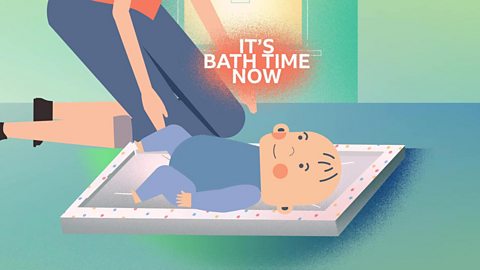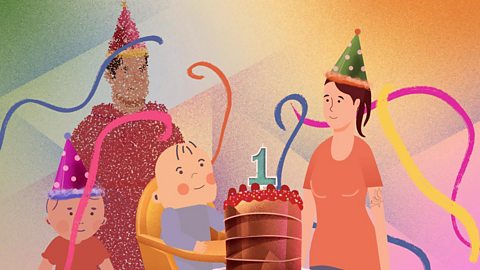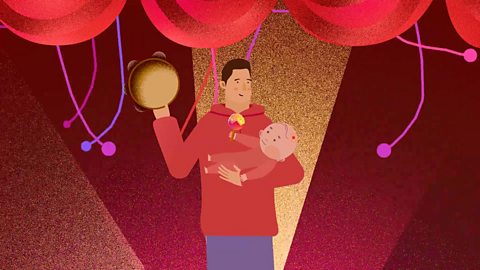It may be hard to imagine when they’re so tiny, but little ones’ brains are busy making memories all the time. In fact, they have been since before birth, according to Dr Jane Gilmour, a consultant clinical psychologist at Great Ormond Street Hospital and Programme Director in child development at University College London.
“Babies need memory to learn and navigate the world. And they even recognise speech patterns they hear in the womb”, says Jane. “Their memory systems get more efficient over time and have a particularly impressive speed of development in the first year of life - but it is a work in progress.”
The science behind remembering is pretty complex, mainly because there are different types of memory. But as Jane explains, each type of memory has its own purpose. And your baby is demonstrating some of them from the moment they are born.
Sometimes people think that babies can't remember things, but that's not quite true. From the moment they're born, babies can recognise the voices they hear the most from being in the womb, and remembering those voices is important, as they help baby learn to talk.
Because they recognise your voice and your smell, they'll watch and listen to you more closely and they'll copy the sound you make and the more you talk to them, the more they'll start to understand the links between the words you're saying and the things you're describing.
Imitating the expressions they make is great too, and the more you repeat things, the more you help improve their memory. But what babies don't have when they're very little is long term memory, which means that although they can remember things like voices, they can't yet remember the details of an event and how it made them feel. They only really start to be able to do that when they're around eighteen months old.
Why do babies need memory?
You might think your baby doesn’t need to remember anything in the early weeks and months as you’re doing everything for them.
But your baby’s memory has a huge role to play in recognising everything around them, from the sight of your face to the sound of your voice. “Memory is not a store cupboard, it’s more of a toolbox”, says Jane.
We need memories to navigate the current challenges in our world. So whether we are six months or 60 years old, our brain wants information that is useful for our here and now experiences.
What is short-term memory and when does it develop?

Short-term memory is the information your brain is focussing on right now. “It has limited capacity - it’s a bit like a shelf, if you pile too many things on it, some will fall off”, explains Jane. “It also means that we can’t remember information in short-term memory for any significant period of time.”
Your baby has the ability to form short-term memories from quite early on, says Jane. “We know that babies recognise their mother’s voice at birth. A day or two later, they can recognise her face. And then a day or so after that, the taste of her breast milk. What a perfect set of skills for a newborn: it allows the baby to identify the person that keeps them safe and nourished.
With a baby’s recognition of their parent comes positive reactions (like gazing at them with their eyes) which are likely to pull the parent and baby closer together to form a bond.

What is long term memory and how does it develop?

Long-term memories are stored by the brain for a long period of time. “If the short-term memory includes particularly useful information, the brain will move it from the short-term memory into the long-term memory store”, says Jane. For your child, this could be anything, from recognising grandparents they don’t see often, to remembering words when they start talking.
Long-term memory takes a while longer to develop than short-term memory, but it’s something your growing baby will be working on. “Younger babies will forget what they have learned more quickly than older infants”, says Jane. “One experiment found babies learn that by kicking in a particular way, they can make a mobile move. Eight-week-old babies can learn to move the mobile but they forget what they have learnt within a few hours, while three month old babies can remember it for up to a week.”
What are explicit and implicit memories?
There’s a lot more to memory than just short and long term.
Explicit memories are facts about the world around us - for example, balls are round. Some experts say babies develop these types of memories at around nine months.
Implicit memories are things we learn to do without thinking - for example, how we pick up a ball. Implicit memories can be formed from birth.

What is episodic memory?
Episodic memory is a special sort of memory that your little one will develop when they are around 3 or 4. “Put simply, an episodic memory describes when and where a memory happened and who was there,” Jane explains. So for example, your child might remember who they played with at preschool that day.
How far back can we remember things?
Think back to your childhood - what’s your earliest memory? It’s unlikely to be anything from when you were a baby, says Jane. And there’s a reason for that.
“There’s something known as childhood amnesia. There is strong evidence that adults will usually say their first childhood memory was an event that happened when they were 3 or 4 years old.
Recent evidence suggests that if you ask primary school-aged children about their first memory, they will recall much more early experiences than adults would.
5 easy ways to help your child's memory develop

The science behind your baby’s developing memory may be complicated, but there are lots of simple everyday activities you can do with your little one to help boost their memory. Here are some easy ideas from Jane and Early Years Educational Psychologist, Dr Abigail Wright.
1. Start simple
Keep things easy to start with, says Abigail. “Babies and young children can become easily overstimulated with too much sensory input. Focusing on some very simple, repeated activities can be more effective than trying to support their memory in lots of different ways.”
This could be as simple as asking your toddler what they put on their feet (shoes and socks).
2. Chat about past events
Talking to your child about things that have happened in the past is a great way to help them develop their long-term memory. This could be things you saw out of the bus window on the way to town or what you did last weekend. “Reviewing the events of the day together is a good family habit for many reasons. It helps build storytelling skills which encourages literacy and it is good for bonding,” says Jane.
3. Be multi-sensory
Along with talking to your child, Jane recommends adding lots of different sensory cues to help your little one remember different things. “Any information you offer your baby is more likely to be consolidated if it’s repeated and delivered in a multi-sensory way using sound, touch, taste, smell and so on”, she says. “For example, add hand movements as you sing a nursery rhyme to help babies learn.”
4. Be consistent
“Babies and children learn best through high levels of repetition”, says Abigail. “This is because repetition helps to build new connections in the brain and it helps babies and young children to experiment and learn new skills.” Think about repeating activities, like this easy “Can you remember?” game. Pop different objects on a tray and then see if your child can remember what was on there. You can play this again and again!
5. Get into a routine
Just as you can repeat games, doing the same thing every week can also help your child’s memory develop. Abigail says, “Repeating specific activities at certain times of the day or week can help to provide those all-important repeated experiences.” If you walk to the shop every week, turn that into a memory-boosting moment by taking turns with your child remembering what you saw on the way.
Dr Jane Gilmour is a Consultant Clinical Psychologist at Great Ormond Street Hospital and co-author of How to Have Incredible Conversations with Your Child and The Incredible Teenage Brain.







